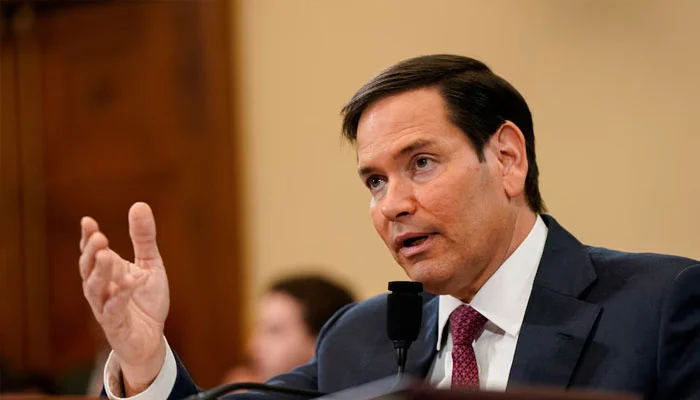US Secretary of State Marco Rubio announced on Wednesday that the United States will impose visa bans on foreign nationals deemed to be censoring Americans, suggesting this new policy could target officials regulating US tech companies, as reported by Reuters.
Rubio did not specify any particular instances of censorship. However, US tech companies and the Trump administration have previously challenged US allies in Europe, alleging censorship on social media platforms. Restricting officials from visiting the US appears to be an escalation by Washington.
In a statement, Rubio declared that a new visa restriction policy would be applied to foreign nationals responsible for the censorship of protected expression within the US. He asserted that it is unacceptable for foreign officials to issue or threaten arrest warrants for social media posts made on US soil.
“It is similarly unacceptable for foreign officials to demand that American tech platforms adopt global content moderation policies or engage in censorship activity that reaches beyond their authority and into the United States,” Rubio stated.
Rubio further claimed that some foreign officials have taken “flagrant censorship actions against US tech companies and US citizens and residents when they have no authority to do so.”
US social media companies, such as Meta (parent of Facebook and Instagram), have previously contended that the EU’s Digital Services Act (DSA), a content moderation law, amounts to censorship of their platforms. In March, the Trump-appointed chairman of the US Federal Communications Commission warned that the EU Digital Services Act excessively restricts freedom of expression.
In January, Meta announced it would discontinue its US fact-checking program in favor of community notes on controversial posts, though the company continues fact-checking in other regions, including Europe and Latin America.
EU regulators have issued preliminary findings stating that X, the platform owned by Trump ally Elon Musk that also relies on community notes, has breached the bloc’s content moderation rules.
EU officials have defended the Digital Services Act, explaining that its purpose is to create a safer and fairer online environment by compelling tech giants to take greater action against illegal content, including hate speech and child sexual abuse material.
A European Commission spokesperson acknowledged awareness of Rubio’s announcement, describing it as “general,” and declined to comment further.
The EU has been pursuing a trade deal with Washington, aiming to circumvent President Donald Trump’s threatened 50% tariffs on European imports. Rubio’s announcement was made just before his meeting with German Foreign Minister Johann Wadephul in Washington.
Europe Labeled ‘A Hotbed of Digital Censorship’
Trump officials have consistently intervened in European politics to denounce what they perceive as the suppression of right-wing politicians, notably in Romania, Germany, and France. They have accused European authorities of censoring views, such as criticism of immigration, under the guise of countering disinformation.
In April, Rubio controversially shut down a State Department office that had been tasked with countering foreign disinformation, accusing it of censorship and wasteful spending of US taxpayer money.
In a social media post on Wednesday, Rubio added, “Whether in Latin America, Europe, or elsewhere, the days of passive treatment for those who work to undermine the rights of Americans are over.”
Rubio refrained from naming specific countries or individuals that would be targeted by the new policy.
Brazilian Supreme Court Justice Alexandre de Moraes has notably clashed with X over compliance with orders to remove accounts accused of spreading misinformation. Trump’s media company, alongside video sharing platform Rumble, has also sued the judge over an order to remove the accounts of Allan dos Santos, a US-based supporter of former Brazilian President Jair Bolsonaro.
Chris Pavlovski, CEO of Rumble, expressed his approval of the visa ban policy on Wednesday. “As Rumble has experienced, these enemies of free speech from around the world try to reach into America and supersede the First Amendment,” he stated.
A Brazilian government source, speaking on condition of anonymity to Reuters, stated that the Brazilian government is awaiting a full understanding of who could be targeted by the ban and its ultimate scope.
The Trump administration has repeatedly criticized European nations for perceived censorship of online content.
Vice President JD Vance, during a visit to Paris in February, denounced content moderation, labeling it “authoritarian censorship.”
Rubio has consistently argued that threats to free speech constitute an attack on shared values crucial to the US-European relationship and has indicated that this issue is being raised in diplomatic discussions with both the EU and Britain.
Officials from the State Department’s Bureau of Democracy, Human Rights and Labor are concurrently visiting EU member states France and Ireland this week to press those governments on freedom of expression, a State Department official told Reuters, requesting anonymity.
An op-ed by Samuel Samson, a senior advisor for that bureau, accused Britain and Germany of censoring online speech and asserted that the EU Digital Services Act was “used to silence dissident voices through Orwellian content moderation.” He also cited Britain’s jailing of two anti-abortion activists.
“Far from strengthening democratic principles, Europe has devolved into a hotbed of digital censorship, mass migration, restrictions on religious freedom, and numerous other assaults on democratic self-governance,” Samson wrote.



